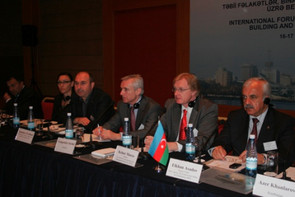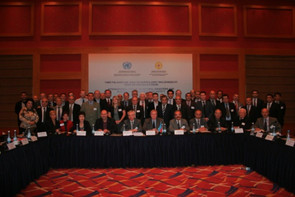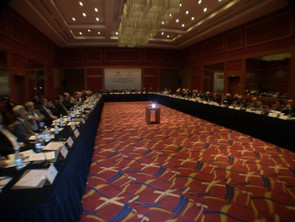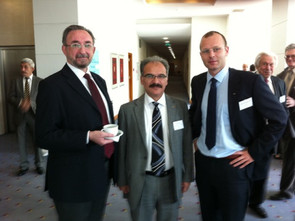Baku, Azerbaijan
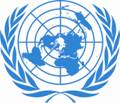 |
 |
|
UNITED NATIONS
ECONOMIC COMMISSION FOR EUROPE |
MINISTRY OF EMERGENCY SITUATIONS
OF AZERBAIJAN |
International Forum on Natural Disasters and Building and Construction Safety
in Baku, Azerbaijan, 16-17 November 2010
| Key Information Where When Who
|
Across the UNECE region, people and the places where they live are at risk. Natural disasters like earthquakes, hurricanes or flooding cause material devastation and human casualties. Human casualties and damage to the housing stock can be avoided if an effective system of disaster prevention is created that includes provisions for building safety. National building codes in the region should conform to the highest standards, but more importantly, be enforced, in order to prevent these disasters. The UNECE Committee on Housing and Land Management has decided to address this problem and organized a workshop on building safety/disaster preparedness in Baku, Azerbaijan. The workshop took place on 16-17 November 2010.
Risk for natural disasters is widespread throughout the ECE region. It affects countries in all sub-regions, from North America over Western, Southern and South-Eastern Europe to Central Asia. Specific regional risks vary by geography and geology. Each country must evaluate their situation, studying the potential for disaster and implementing sound land-use planning and building codes accordingly. Each settlement has its own geological, geographical and cultural specificities. However, there are similarities and solutions that can be evaluated and adjusted for each particular situation. It is important to learn as much as possible from each other, as very few cities or even national governments have experience with more than one 50 or 100-year disaster event. Sub-regions share important characteristics in building types, income levels, geography and geology. It is important, that national Governments involve their municipal governments in the learning process, or in sharing their experience, as much of the responsibility for implementation and enforcement of policy changes will fall to them. The workshop will look at a number of case studies that highlight the risks involved, and the importance of being proactive in assessing danger, bearing in mind the specificities of each country. In this context, the value of improved building codes, improved land use planning, and programmes to retrofit buildings becomes clear. Prevention for disasters is a complex process in which building safety and land management play a crucial role. The workshop will address the two dimensions of building safety in relation to natural disasters: prevention and post-disaster reconstruction.
|




